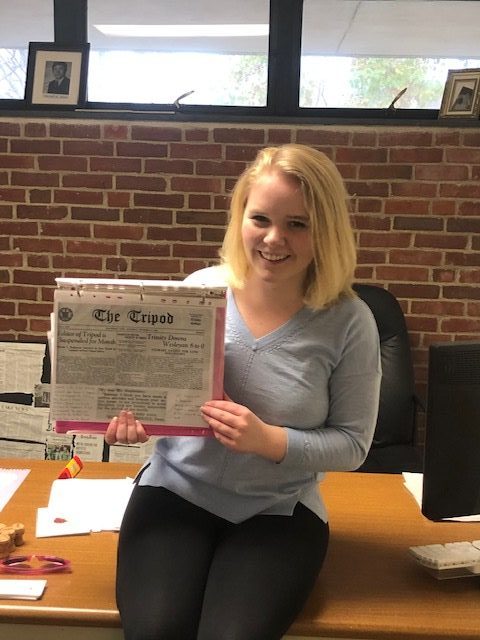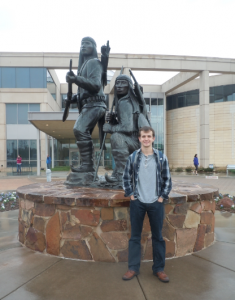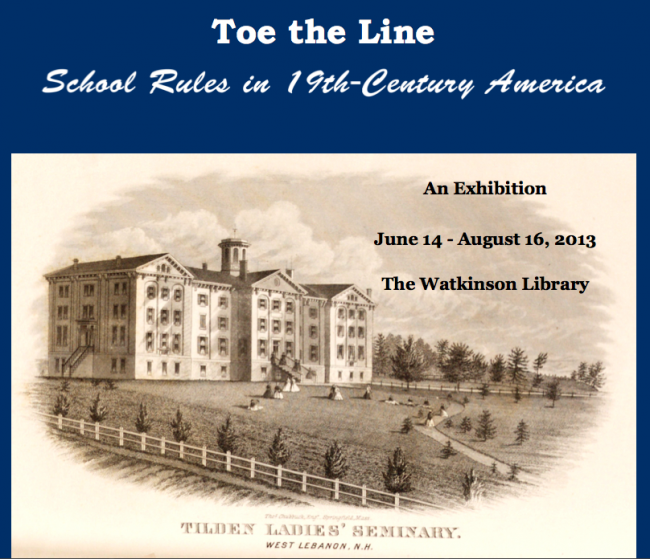Congratulations to Our Class of 2020 History Thesis Writers!
By Brendan W. Clark ’21
Editor; History Major
Congratulations to four of the History Department’s senior majors who presented the culmination of a year’s worth of research and study this past Friday!
Despite the difficulties which beset the end of their work from the coronavirus crisis, Gillian Reinhard ’20, Aidan Turek ’20, William Tjeltveit ’20, and Connor Struyk ’20 presented their research to the department’s faculty and friends via thoughtful presentations on Zoom.
Reinhard’s thesis, “Orientalist Opera: Western Perceptions of the Other in the Early Twentieth Century,” focused on the premiere of Giaccomo Puccini’s Turandot at the Royal Opera House in London during the 1920s. Reinhard relied on a variety of primary source material and newspaper coverage of the premiere and sought to examine the place and extent of Orientalism in the British imagination. Drawing on scholarship from noted British historians Robert Bickers, Sarah Cheang, and John MacKenzie, Reinhard also argued for a greater recognition of the opera as serving the imperialist ambitions of the British Empire. You can read more about Reinhard and her thesis, which were profiled by History@Trinity in November, here.
A Concise History of Trinity College and the 1918 Influenza
By Brendan W. Clark ’21
Editor; History Major
An Introduction: The Pandemic of a Century
A review of Trinity’s response to the 1918 flu pandemic, often referred to as the “Spanish influenza” or the “Spanish flu,” is doubtless merited in our present time living through the 2019 coronavirus.[1] With that in mind, the following is a recitation of Trinity’s actions and some student responses made during the course of an event that impacted millions at the start of the twentieth. There are admittedly few Trinity sources, but those that remain illumine this region of history so relevant for us today and form the subject of our study.

While the College archives reveal that Trinity was not unaffected by the pandemic, there is no mention of it in our two major annals of College history. Esteemed College archivist Peter Knapp ’65 makes no mention of the pandemic in Trinity College in the Twentieth Century. Rather, he notes correctly that the gravamen in 1918 for the College—and President Flavel Sweeten Luther ’70—was World War I and the institution’s military response. Knapp, quoting Luther, indicates that “other areas of concern included student social and academic life, which had suffered from the disruptions of World War I.”[2] Knapp notes, also, that the College held its Commencement in June 1918 in the midst of the pandemic. Indeed, with former President Theodore Roosevelt in attendance as an honorand and speaker, he gave his peroration to “‘the largest crowd of people ever assembled at one time on campus,’ estimated at approximately 5,000.”[3]
Senior Thesis Profile: Aidan Turek Examines Albert Speer and Nazi Apologists
By Brendan W. Clark ’21
Editor; History Major
Aidan Turek ’20 is the President’s Fellow in Political Science and a senior thesis writer in the History Department. History@Trinity’s Brendan Clark spoke with Aidan to ask him a few questions about his thesis and his experience with the History Department.

1. Describe your research topic in two minutes or less (let’s say 200 words or less).
My thesis is a study of Albert Speer, the famed Nazi architect, designer, and industrial genius who was Hitler’s right-hand man and a possible successor. Specifically, I’m examining his life and legacy through the lens of biographization—how historical memory is constructed and deconstructed. Speer was intimately involved in the functioning of the Third Reich, and yet at Nuremberg he successfully presented himself as an apolitical technocrat, and in doing so escaped the executions that befell his colleagues. In his hugely influential autobiography, Speer basically set the tone for Nazi apologists, manipulating his own life and historical fact to prove his own innocence. While more recent biographies have gone back and seriously questioned his life, to this day Speer still guides the discourse surrounding him, and thus Nazism more generally. My goal is to reopen some of the areas neglected by Speer and his biographers, to explore interesting facets of his life that reveal the true extent of his moral culpability and the criminal nature of his actions. I think that researching Speer allows me to delve into fascinating ethical questions while also exploring and illuminating just how history gets constructed.
2. What specific aspects of your academic career at Trinity and your personal historical interests led you to select this topic?
This actually all started after watching a YouTube video about one of Speer’s projects. I figured myself an amateurish expert in World War Two, but Speer’s name had only come up in passing, and none of it dealt with his unique contributions to fascism. And then there’s the fact that he died so recently—in 1981—which got me wondering how Nazis could stick around and have a say for that long. Personally I was drawn in by this muddle of philosophical and historical trends, but I gained quite a bit from Trinity as well. I have an avid interest in political science and German studies, and Albert Speer and his life have actually come up quite a bit. I’ve encountered scholars in classes that discuss the direct historical background, like Weimar Germany’s political culture, alongside literature on the authoritarian capacity of architecture. I was also fortunate enough to travel to Berlin with Trinity to get a hands-on look at what I’ve been researching.
Senior Thesis Profile: Gillian Reinhard Talks Turandot and Tripod
By Brendan W. Clark ’21
Editor; History Major
Gillian Reinhard ’20 is the President’s Fellow in History, the Department’s inaugural Chatfield Fellow, and a senior thesis writer. History@Trinity’s Brendan Clark sat with Gillian to ask her a few questions about her thesis and her experience with the History Department.


- Describe your research topic in two minutes or less.
I am looking at the 1926 opera Turandot, by the Italian composer Giacomo Puccini. The first part of my thesis concerns how different cultures portrayed exoticism and embraced Edward Said’s concept of Orientalism. I am applying what I have learned in the first chapter to look specifically at how British audiences perceived Puccini’s opera when it arrived in London a year later, again from the perspective of Orientalism. The relationship between Britain and China is a unique one, with a long, complicated history, and I am hopeful that an analysis of this opera can shed light on this relationship.
- What specific aspects of your academic career at Trinity and your personal historical interests led you to select this topic?
Firstly, I have studied Mandarin Chinese since middle school and had the opportunity to study abroad in Shanghai during the fall of my junior year. My experience abroad truly shed light on the concept of Orientalism in the West. Also, I read Orientalism, by Edward Said, in my first-year seminar “Arabian Nights” with Associate Professor of History Zayde Antrim. That text has shaped much of my academic work. I decided to look at it through the lens of opera, as it has always been a quirky interest of mine.
Michael McLean: Senior Honors Thesis

Trinity senior Michael McLean has always been fascinated by Native American history. Particularly, he sees its underrepresentation in mainstream United States history as a striking opportunity for research. A visit to the Cheyenne River Reservation in South Dakota last winter and related coursework at Trinity motivated him to pursue a senior thesis on the impact of the Civil War on Indian territory.
McLean is also a recipient of the Colin Leroy ’10 Research Fund, which assists history majors with research-based travel and other projects.
[Editor’s Note: History@Trinity will publish soon an article describing the Colin Leroy ’10 Research Fund program, which was established in 2012 to help seniors and rising seniors conduct research for their senior theses.]
Following a recent visit to Oklahoma sponsored by the fund, he has kindly provided History@Trinity with the following statement on his trip:
“From October 23-27, I traveled to the Oklahoma Historical Society in Oklahoma City, in large part due to a grant from the history department set aside for thesis research.
My honors thesis, “We Thought We Had Some Trouble Last Year: Destruction, Survival, and Community during the Civil War on Indian Territory,” is focused on what is today Oklahoma. I am also approaching this subject from the bottom-up. Therefore, the archives in Oklahoma were extremely useful. I was able to use letters, diaries, ledgers, rosters, and war claims to better understand the everyday experiences of regular civilians and soldiers in the area, especially with regards to food, communication and seasonality.
I will specifically be looking at the surprising adaptations that were used during this tumultuous period and how people were able (or forced) to create and maintain communities for their survival.
I am sincerely grateful towards the History Department and the parents of Colin Leroy ’10, who created the research fund, for affording me this opportunity.”
The History Department commends McLean and all other senior thesis students on their hard work.
We also encourage current juniors to consider writing a thesis next year. Please contact your academic advisor and visit the application procedure page available on this website through the menu that appears at the top for more information.
Toe the Line Exhibition at the Watkinson Library
Title of Exhibit: Toe the Line School Rules in 19th-Century America
Description: School catalogs and reports drawn from the professional library of educational reformer Henry Barnard. “Henry Barnard was born on January 24, 1811, in Hartford, Connecticut. From 1837 to 1839, he belonged to the Connecticut state legislature. In 1838, he founded the Connecticut Common School journal. In 1845, he became Rhode Island commissioner of public schools. He was hired as the U.S. first commissioner of education in 1867 and resigned in 1870. Barnard died on July 5, 1900, in Hartford, Connecticut.”
Dates: June 14-August 16, 2013
Prof. Antrim’s “Mapping the Middle East” featured on the Watkinson Library’s Blog

Originally posted on The Bibliophilie’s Lair: The serendipitous discovery of COOL STUFF in the Watkinson
“Several days ago we hosted professor Zayde Antrim’s “Mapping the Middle East” class. The students pick a historical atlas and answer a questionnaire about aspects of what they see. Here is the course description: “This course approaches the history of the Middle East through maps. It will look at the many different ways maps have told the story of the territory we now call the Middle East and the many different points of view that have defined it as a geographical entity. Readings will analyze maps as social constructions and will place mapmaking and map-use in a historical context. We will relate maps to questions of empire, colonialism, war and peace, nationalism, and environmental change.””
Check out The Bibliophile’s Lair HERE.


